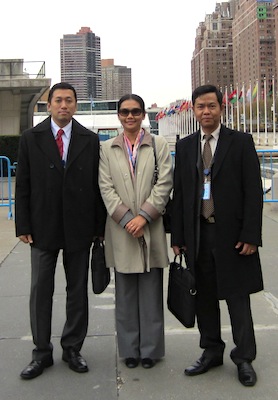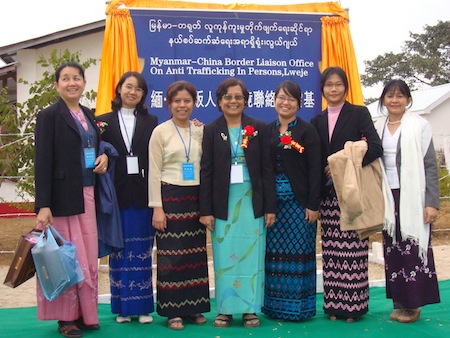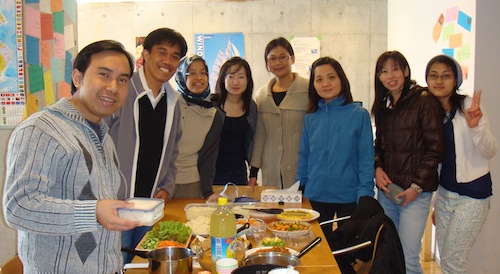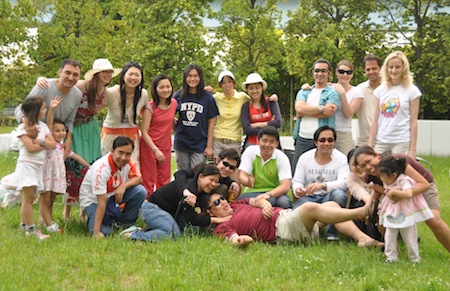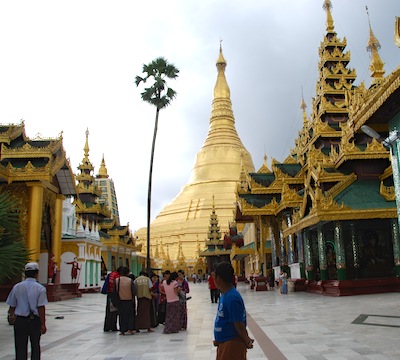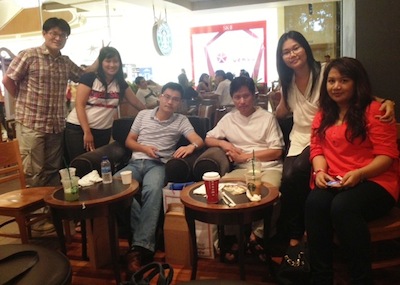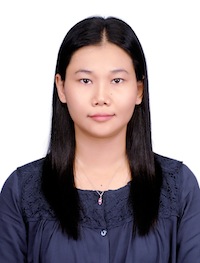 Aye Thidar Myo, Myanmar
Aye Thidar Myo, Myanmar
First Secretary, Permanent Mission of the Republic of the Union of Myanmar to the Association of South East Asia Nations, Jakarta
Young Leaders Program (’10)
Please tell us about your career in the Ministry of Foreign Affairs thus far. What is your area of specialization and how did you come to work in this area?
Right after graduation from Yangon University in 1997, I joined the Ministry of Foreign Affairs, as a career Foreign Service Officer. Since the beginning of my career, I have been covering multilateral and regional issues. I was first posted to the Political Department, as an ASEAN Desk Assistant, and one year later, transferred to the International Organizations and Economic Department. During my initial years in the Ministry, I had the opportunity to join several training courses, including an English language training course in New Zealand.
When I started my career at the ASEAN Desk, Myanmar was at its final stages of becoming a member of the Association of the South East Asian Nations. Though I was a junior officer with limited knowledge of multilateralism, that period seeded my passion to become a multilateral diplomat. That spark was ignited when I was assigned to the Permanent Mission of Myanmar to the United Nations, New York, in 2005. My time in the Myanmar Mission, from 2005-08, was the stormiest era for my country in the international arena.
In 2009 to 2010 I was at GRIPS and from January 2012, I am serving as a First Secretary at the Permanent Mission of the Republic of the Union of Myanmar to ASEAN.
The experiences during my career thus far represent both some dark as well as bright sides of multilateralism. A deeper analysis shows that there may be attempts to use the world’s international organizations for political purposes. However, knowing that there are member states that are ready to stand on principles is the bright side of multilateralism.
After returning from my assignment in New York, I was posted to the International Organizations and Economic Department. As a desk officer for the third committee, also known as the Social, Humanitarian and Cultural Committee, I was involved in the process of drafting Myanmar’s Plan of Action for Preventing Recruitment of Under-aged Children in the Armed Forces and drafting the blue print for Myanmar Human Rights Commission. I also assisted the High Level Representative of Myanmar during the drafting process of the Terms of Reference of the ASEAN Intergovernmental Commission on Human Rights.
As a desk officer for Human Rights and Humanitarian Issues, I also got the opportunity to take part in bilateral efforts between Myanmar and China in the fight against human trafficking along the border areas. I was mostly involved in the repatriation process of the trafficked victims. That experience sometimes gave me joy and warmth but sometimes it was painful to see the trauma of the trafficked victims. Trafficking in persons is a billion dollar business that sacrifices the lives of millions of innocent victims. It is a widespread crime of 21st Century and one that we should not tolerate to be brought into 22nd century.
You are currently posted as First Secretary of the Permanent Mission of Myanmar to ASEAN in Jakarta. Please tell us about the Permanent Mission, and your main responsibilities and duties.
Since the beginning of ASEAN, the dream of the founding fathers had been to create a rule-based organization that stands for the people of the region. That dream came into reality in 2007, during the 13th ASEAN Summit in Singapore by the signing of the leaders of the ten member nations to the ASEAN Charter.
The Permanent Missions of the ten ASEAN member states were formed according to the provision set out in the Charter. The Committee, composed of Permanent Representatives who are appointed to the respective ASEAN Member States’ Missions, is called the Committee of Permanent Representatives (CPR). We are members of a supporting group, called Committee of Permanent Representatives Working Group (CPRWG), which does the entire initial work for CPR.
CPR and CPRWG cover the subjects related to ASEAN community building process, relations with its Dialogue and Development Partners, overseeing the management of the ASEAN Secretariat and assisting the Foreign Ministers Meeting and Summits. Since I am one of the members of CPRWG my daily duty is to manage, assist, liaise and organize among us through a series of meetings.
Moreover, I am also playing a role in Myanmar’s preparation process for the 2014 ASEAN Chairmanship. The responsibility and pressure are immense; however, we do believe that we will fulfill that duty successfully.
What are some of the biggest challenges you face in your work?
There are always challenges in a person’s life. For me, in my current work, the challenge that I am trying to overcome is the different nature of regional and multilateral work.
I find understanding my own region’s culture of communication much harder than the more ‘global’ working environment I experienced as a UN diplomat in New York. The ‘ASEAN Way’ is interesting and most challenging for the member countries as well as for the ASEAN diplomats. To reach a consensus on any issue takes time and requires a painstaking negotiation process.
What has been the most interesting and rewarding aspect of your career thus far?
The most interesting aspect of my career was my tour of duty at the Myanmar Mission to the United Nations in New York. It has opened my eyes to global issues. The UN is like a university where one can learn new things every day. The most rewarding aspect was the feeling that I was at the forefront when things were most difficult for my country, or regional group I belong to.
Myanmar has seen big changes recently. What do you see as the main challenges and opportunities for Myanmar over the course of the next five to ten years?
Before talking about next five to ten years, let me recall my sincere wish in the past ten years or more. To be straightforward, I wished to see my country as a shining example of democracy and human rights, and a country deciding on our future without any outside pressure and interference, and as a normal country.
Now, Myanmar is transforming to a truly democratic country, one that is inclusive and equitable. The people of Myanmar have been yearning for freedom and democracy for decades. Now that this aspiration has become a reality, the biggest challenge is to use this opportunity wisely and responsibly. Another main challenge is national unity, which must be realized through national reconciliation.
What led you GRIPS? What was the most important thing you learned while here and how has your experience at GRIPS prepared you for future endeavours?
The knowledge of international relations is vital for a diplomat. While I had practical knowledge regarding multilateral affairs, I needed to widen my horizon so that I would be able to perform my duty as a multilateral diplomat on par with my colleagues in the field. Therefore, I always wanted to have time to study and exchange views with persons who have a broader knowledge in the field of international relations. This was the main driving force for me to join GRIPS.
The experience at GRIPS has been priceless. Obtaining a Master’s degree in one year means the program is quite intensive, with a large number of credits needed to fulfill the graduation requirements. It requires determination, self-confidence, dedication and a strong will to complete that goal. In addition to the knowledge acquired, these are all essential traits in laying a good foundation for my future endeavours.
What is your fondest memory of your time spent at GRIPS?
Let me simply say that time that I spent at GRIPS is the fondest memory in my life.
What do you miss about Myanmar and how do you like living in Jakarta?
Myanmar will always be with me wherever I go, and whenever I want, because it is my motherland and no one can take it away from me. I do not have severe homesickness. However, the memory of a misty morning on the hill where the Shwe Dagon Pagoda is situated will be with me forever.
I miss the Shwe Dagon Pagoda every time I am away from my country. I miss it not only for religious reasons but because it is the symbol of peacefulness, strength, belief and courage. On top of all, Shwe Dagon symbolizes the history and achievement of my people.
Living in Indonesia is amazing. There are many areas where you cannot resist to visit or explore; Jakarta is one of that kinds. I like tropical fruits, orchids, and the people too. They are honest and humble and amazingly patient.
What is your favourite thing to do when you are not working?
I am fond of decorating and tidying my apartment. Indoor plants, decorative things, pots, vases and small teddy toys are my favourite items to decorate my apartment with.
Here in Jakarta, one of the things that I like best are the fresh orchid shops. Orchids are inexpensive and beautiful, and here I can easily get the potted, fresh, healthy and beautiful ones. They make my days, and I am enjoying decorating my humble apartment with orchids, indoor plants and beautiful hand-made things.
How do you maintain the balance between work and the rest of your life?
To be honest, I am not good at balancing between work and my life. My work is my life, so far. However, I do make time to regularly call to my mother and two aunties back in Myanmar. They are in their eighties and seventies. Listening to their daily stories is part of my life and my duty and I am happy to do it.
If you could give one piece of advice to anyone considering studying at GRIPS what would it be?
Grab that chance, explore the world of well-experienced academicians, and make friends with international and local students. And above all, enjoy your student life in a beautiful unique country!
Do you have any suggestions on how to further utilize the GRIPS alumni network?
The GRIPS alumni network is a well-established and renowned one. It is always enjoyable to get to know each other, and meet with former and current students.
The network helps potential GRIPS students to better understand life and study at GRIPS and how it can benefit their life after graduation from GRIPS. It is also a place where we can share thoughts, ideas and believes with others. Above all, the alumni network is offering a window of opportunity to promote your country among the potential leaders of the nations around the world.
Currently, three more GRIPS alumni – all graduates from the Young Leaders Program – Mr. Zhou Lei (‘10) from the People’s Republic of China, Mr. Heng Sarith (‘10) and Mr. Hok Sopheap (‘07) from Cambodia, are serving at their respective Permanent Missions to ASEAN in Jakarta. It is truly a big reunion for us. Sometime we can share good times together, apart from the busy schedule.





